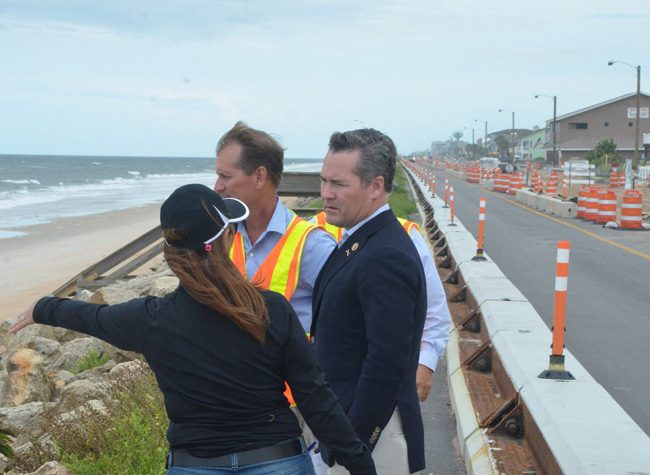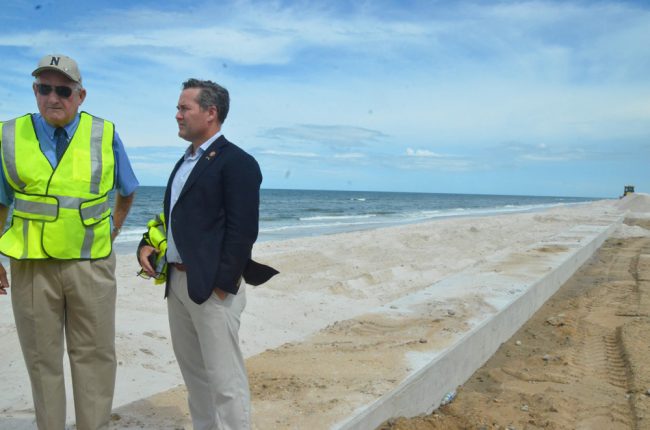
Standing on the freshly poured 4-foot wide concrete cap atop the seawall that slices down 36 feet below the dunes at the north end of Flagler Beach this afternoon, U.S. Rep. Mike Waltz asked the state Department of Transportation engineer and operations director responsible for the project the question the wall’s existence–and that of the sand that’ll keep getting poured over it when it erodes–begged: “I wonder if there’s some other long-term solution besides more sand.”
There was no answer beyond the sort of beach renourishment approach the U.S. Corps of Engineers takes, and the building of walls, to protect roads and property, that the transportation department takes. And the hope that the new seawall will withstand the storms ahead. “It’s as stout of a wall as I could imagine,” Ron Mead, DOT’s District 5 operations engineer, said. “I couldn’t say that this would stand up to a Class 5 or 4,” he said, but likely any storm up to Category 3.
But long-term solutions were on Waltz’s mind as the congressman was in Flagler County for the second time this week, touring the transportation department’s pair of $22.4 million projects at the north and south ends of Flagler Beach, getting a primer on the two hurricanes that shredded the coast in 2016 and 2017, the county’s own $20 million dune-renourishment project that just ended over some 11 miles of beach, and the U.S. Corps of Engineers’ $50-year, $100-million project about to start along 2.6 miles of beach south of the Flagler Beach pier.
The first-year congressman–he replaced Ron DeSantis, now Florida’s governor–is clearly and explicitly in a learning-curve phase, but one with a defined focus on at least one of the issues that will be defining Flagler’s and Florida’s near-term future: climate’s effects on its coastal communities. That was one reason he was standing on that wall today.
Waltz serves on the House Committee on Science, Space and Technology and the Armed Services Committee Both of which have a central role in climate-change issues: the military is contending with sea level rise’s effect on innumerable American coastal installations around the world and in Florida. The science of climate change has been itself in contention, at least in some Republican circles. Waltz who also joined the American Flood Coalition, a nonpartisan organization of state and local officials seeking solutions to climate change’s effects, doesn’t question the fact: “Sea levels are rising,” he says categorically.
He intended today’s tour–which he requested of county and transportation department officials–to send a message. “There’s a thousand issues where we could spend our time in the district in. Of all the places I could be, I’m here, because I think this is an incredible issue, one I want to focus on,” he said in an interview this afternoon as a county bus was ferrying him through Flagler Beach. “So I’m still sinking my teeth into what those long-term solutions are. Right now I want to get my grasp on what we’re doing here and now.”
That grasp is informed by an unswerving conservative approach: “I’ll tell you what I don’t want it to be. I don’t think massive government mandates like the Green New Deal are the answer, because I don’t just don’t think they make fiscal sense.” He includes the carbon task among those approaches. The Green New Deal is a non-biding congressional resolution Introduced by U.S. Rep. Alexandria Ocasio-Cortez, a New York Democrat, and Sen. Edward J. Markey, a Massachusetts Democrat, calling for a move away from fossil fuels and aggressive curbs on greenhouse gas emissions, including a carbon tax.

“I just co-sponsored a bill that looks at carbon capture on military installations, right? I think that’s very different than a carbon tax,” Waltz said. (Technology-based carbon capture–as opposed to trees, which also capture carbon–is in its infancy, and while promising, remains extremely expensive and inefficient for now.)
“Without getting into the weeds of each and every technology I think the broader point is, let’s look at market-based solutions. So for example one of my first visits was to FLP’s solar farm in Samsula,” Waltz said of the 745-megawatt, 330,000-panel farm that combines electricity generation with habitat protection. “I have on my calendar to be at the opening of Duke Energy’s new solar farm. I think energy diversity is part of the solutions.” He includes nuclear in that diversity, saying he’s “all for it,” with the caveat that “it doesn’t make sense for all places.” But he sees the question “not just as a climate issue. It’s an energy-diversity issue. It’s a national security issue.”
Speaking of his experience in the military–he served several tours in Afghanistan, among other places–he said it was “incredibly frustrating to me to see us, putting on my military and veteran hat, to be carting diesel fuel over incredibly insecure supply lines that were being attacked with IEDs and ambushes, to remote outposts that easily could have been provided with some solar panels and a turbine, and been energy independent.”
But he’s not for getting away from fossil fuels. “No, I would like us to get to energy diversity makes sense. That’s different than deliberately moving away. I think the United States from both a tactical level and a strategic level should have a mix. I don;t think forcing one from the government standpoint, forcing one type of energy versus the other, is a solution. I think it could be market-driver. For example, if you talk to Florida Power and Light, they are now marketing many solar fields along with new housing developments, and it has actually become–because this is how the conversation has changed–it has actually become attractive to people when they buy their home to know that their housing development is partially or wholly reliant on solar rather than on the grid.”
He was not opposed to subsidies to certain start-up industries to spur innovation, “but it has to be done in moderation. There can’t be favoritism,” he said. He pointed to the American oil and gas industry’s resurgence in the fracking era, to the point of now exceeding Saudi Arabia’s production and again becoming a net exporter for the first time since the early 1970s, which has had beneficial consequences for national security.
Much of Waltz’s tour focused on the nuts and bolts of the county’s and the state’s efforts to rebuild the coast after Hurricanes Matthew and Irma, and what it will take in the near to medium term to keep the effort going–in sand and financial commitments. DOT’s A1A project at the north end of Flagler Beach–5,000 feet of seawall Nearly 5,000 feet of sea wall from North 18th Street to Osprey Drive–is completed but for some additional sand to entomb the wall and plants to green its dunes. DOT’s Ron Mead says the road-reconstruction south end of town is scheduled to be done by November, but “we’re anticipating finishing sooner,” he said.
County Commissioner Dave Sullivan was the only elected official on the afternoon tour. “It’s very important for our elected officials no matter what level to get out and talk to people and see what’s going on, because things change quickly in this day and age,” Sullivan said. “You can be a better person and better elected officials by doing that.” He acknowledged as “all positive” Waltz’s readier willingness to be in the district–a sharp contrast with his predecessor, who had difficulties connecting both physically and personally with people in the district. Waltz, on the other hand, unhurriedly engaged in conversation with anyone who walked up to him this afternoon, including at one point Oceanside Bar and Grill’s owner John Lulgjuraj and his mother, and county bus driver Richard Briggs, who ferried the congressman around.
“There’s just nothing like putting eyes on and hands on,” Waltz said at the end of the tour. “his is what a good commander does. In my experience in the military, you go talk to people on the ground, hear the issues firsthand, see it, and that way when we’re kind of debating these long-term plans, I’m armed with all that on-the-ground knowledge.”





























Rick Belhumeur says
So our U.S. Congressman was in Flagler Beach today escorted by a County Commissioner and County Staff and no one in the City was even informed he was in OUR CITY? The press was invited. I thought our relationship was getting better with the County. This is inexcusable.
Willy Boy says
The sea is relentless, but we must battle her to the last dollar.
Jane Gentile-Youd says
Refreshing to see more and more Republicans concerned about climate change…( like I am)
Even more so to have a Republican Rep who might convince everyone in Washington that climate change is a frightening reality and who cares about his own district. Very uplifting indeed.
WILLIAM J NELSON says
and it will take our last dollars.
Done Deal says
Representative Walsh was very keen to lean on his military experience “putting eyes on and hands on” and “hear the issues firsthand.” I say Hoorah!! Maybe he wanted to see what the citizens see day to day and the outcome we have to live with. The Rosy BS this Commission feeds it’s electorate isn’t solving any problems. Commissioner, Citizen – Code Enforcer should listen more.
Changes are happening in the environment. A lot of Republicans and Democrats and third party representatives are taking it seriously. Now we need them to come together to find realistic solutions we can all live with. One fact is certain, we simply cannot pile sand on the beach fast enough to keep up with Mother Nature!
The man says
You see? That’s the problem right there..ALL meer residents believe EVERYTHING is about them. “OUR city ” says it all. The land doesnt belong to you, it’s you who belongs to the land, hence why you WILL spend all u ever make on repairing that shit for brains, sun down town!!! Mother nature is claiming what’s rightfully hers, which is all of it. You own a lot, a mere lot of land and think you can govern without government. Bravo!